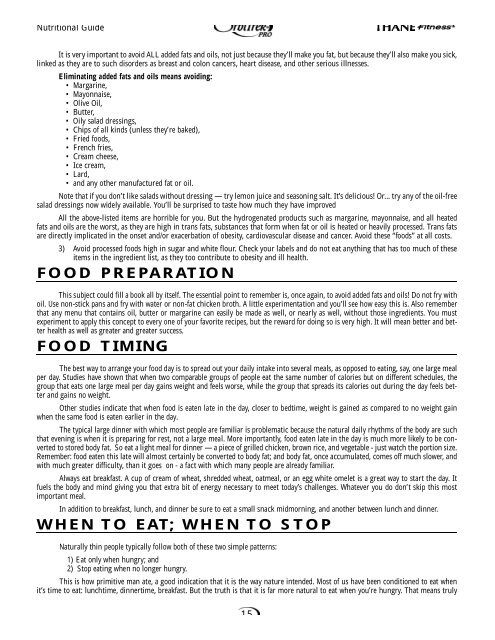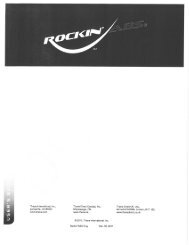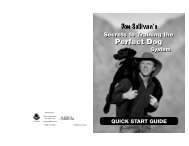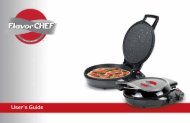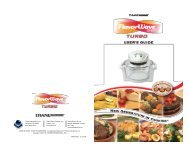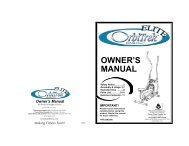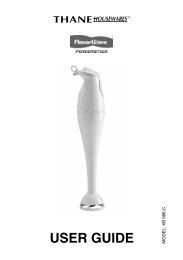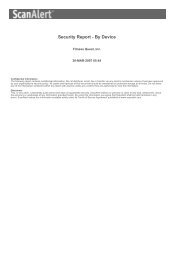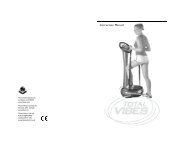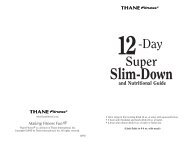Create successful ePaper yourself
Turn your PDF publications into a flip-book with our unique Google optimized e-Paper software.
Nutritional Guide<br />
It is very <strong>important</strong> to avoid ALL added fats and oils, not just because they’ll make you fat, but because they’ll also make you sick,<br />
linked as they are to such disorders as breast and colon cancers, heart disease, and other serious illnesses.<br />
Eliminating added fats and oils means avoiding:<br />
• M a rgarine,<br />
• M a y o n n a i s e ,<br />
• Olive Oil,<br />
• B u t t e r,<br />
• Oily salad dressings,<br />
• Chips of all kinds (unless they’re baked),<br />
• Fried foods,<br />
• F rench fries,<br />
• C ream cheese,<br />
• Ice cream,<br />
• L a rd,<br />
• and any other manufactured fat or oil.<br />
Note that if you don’t like salads without dressing — try lemon juice and seasoning salt. It’s delicious! Or... try any of the oil-fre e<br />
salad dressings now widely available. You’ll be surprised to taste how much they have improved<br />
All the above-listed items are horrible for you. But the hydrogenated products such as margarine, mayonnaise, and all heated<br />
fats and oils are the worst, as they are high in trans fats, substances that form when fat or oil is heated or heavily processed. Trans fats<br />
a re directly implicated in the onset and/or exacerbation of obesity, cardiovascular disease and cancer. Avoid these “foods” at all costs.<br />
3 ) Avoid processed foods high in sugar and white flour. Check your labels and do not eat anything that has too much of these<br />
items in the ingredient list, as they too contribute to obesity and ill health.<br />
FOOD PREPA R AT I O N<br />
This subject could fill a book all by itself. The essential point to remember is, once again, to avoid added fats and oils! Do not fry with<br />
oil. Use non-stick pans and fry with water or non-fat chicken broth. A little experimentation and you’ll see how easy this is. Also re m e m b e r<br />
that any menu that contains oil, butter or margarine can easily be made as well, or nearly as well, without those ingredients. You must<br />
experiment to apply this concept to every one of your favorite recipes, but the re w a rd for doing so is very high. It will mean better and better<br />
health as well as greater and greater success.<br />
FOOD TIMING<br />
The best way to arrange your food day is to spread out your daily intake into several meals, as opposed to eating, say, one large meal<br />
per day. Studies have shown that when two comparable groups of people eat the same number of calories but on diff e rent schedules, the<br />
g roup that eats one large meal per day gains weight and feels worse, while the group that spreads its calories out during the day feels better<br />
and gains no weight.<br />
Other studies indicate that when food is eaten late in the day, closer to bedtime, weight is gained as compared to no weight gain<br />
when the same food is eaten earlier in the day.<br />
The typical large dinner with which most people are familiar is problematic because the natural daily rhythms of the body are such<br />
that evening is when it is preparing for rest, not a large meal. More import a n t l y, food eaten late in the day is much more likely to be conv<br />
e rted to stored body fat. So eat a light meal for dinner — a piece of grilled chicken, brown rice, and vegetable - just watch the portion size.<br />
Remember: food eaten this late will almost certainly be converted to body fat; and body fat, once accumulated, comes off much slower, and<br />
with much greater diff i c u l t y, than it goes on - a fact with which many people are already familiar.<br />
Always eat breakfast. A cup of cream of wheat, shredded wheat, oatmeal, or an egg white omelet is a great way to start the day. It<br />
fuels the body and mind giving you that extra bit of energy necessary to meet today’s challenges. Whatever you do don’t skip this most<br />
i m p o rtant meal.<br />
In addition to breakfast, lunch, and dinner be sure to eat a small snack midmorning, and another between lunch and dinner.<br />
WHEN TO EAT; WHEN TO STOP<br />
Naturally thin people typically follow both of these two simple pattern s :<br />
1 ) Eat only when hungry; and<br />
2) Stop eating when no longer hungry.<br />
This is how primitive man ate, a good indication that it is the way nature intended. Most of us have been conditioned to eat when<br />
i t ’s time to eat: lunchtime, dinnertime, breakfast. But the truth is that it is far more natural to eat when you’re hungry. That means tru l y<br />
15


